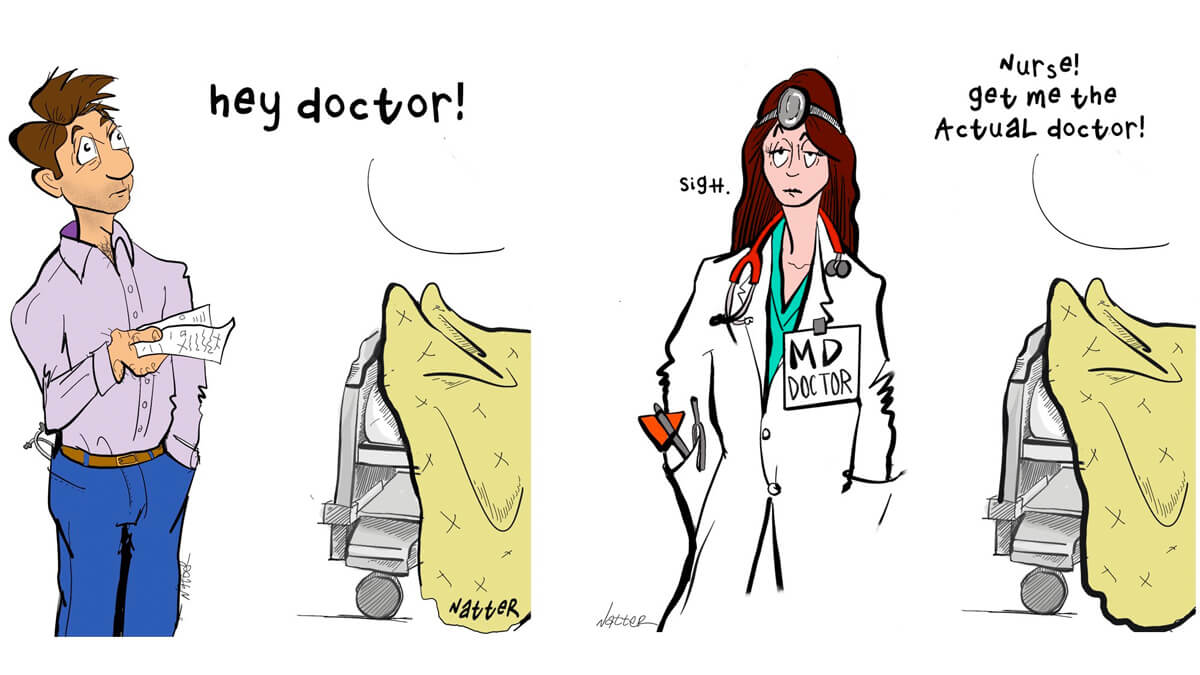I always knew about the existence of inequality and sexism in medicine (and in society at large), but I still remember when I initially witnessed its reality first hand. I was an intern in my primary care clinic. It was toward the end of that year and the allure of the long white coat had lost its appeal on me, becoming more of a yellowish robe that hung on the back of the clinic door. My typical attire consisted of a shirt and tie with my ID badge slotted into my computer, and the occasional stethoscope hung around my neck. My friend, Dr. M, a talented and brilliant internal medicine resident, occupied the exam room adjacent to mine. I noticed that she chose to wear her white coat and ID badge with “MD” emblazoned on the front stuck to her pocket, with “Dr. M” clearly printed on the front.
Our patients would wait in a large seating area outside both our rooms. You could hear as your neighbor would swing open their exam room doors and call out for their next patient, oftentimes introducing themselves with a smile and warm handshake (these were times well before COVID-19 changed our practices). The demographic of our patient population was made up largely of older men. They were products of a certain era, of a certain time.
“Oh, hey Mr. Smith! I’ll be right with you!” I’d say to a gentleman in a chair as I walked my previous patient to the exit.
“Hey doc!” I’d hear, or sometimes, “Dr. Natter! Great to see you!”
I never gave those salutations or titles much thought. Until one day while I was in my room and typing up a progress note between patients, I heard Dr. M step out to greet her new patient. “Hello Sir, I am Dr. M, I will be taking care of you today.” He replied “Oh hey sweetie, you sure you’re my doctor? You are far too young and pretty.”
This was not an anomaly. On many other occasions as Dr. M walked through the halls, MD badge and white coat donned, she’d be greeted with “Hey sugar” and “Hi baby” or “Nurse, when will the doctor be ready to see me?” Even with long-term patients of Dr. M, rarely would I hear her referred to as “Doctor.” Clearly, being assumed a nurse, PCT, or other member of the healthcare team is not an inherently bad thing. However, when one introduces themself as one role, to be designated another based solely on gender is disrespectful. My female colleagues have been experiencing this type of interaction regularly. As a white male doctor, I had not previously recognized the privilege that was implied by being greeted as “Hey doc.” I felt embarrassed at how blind I was to this. I could never understand that perspective, but I felt compelled to learn more.
I decided to ask Dr. M about her experience. I quickly found that it was a sad truth that all or most of my female colleagues had this shared experience. Each of them had differing tactics on how to address sexism in medicine. Some would ignore it, while not excusing the behavior – they would instead defang the disrespectful comments by refusing to acknowledge. Others would firmly explain that those terms were offensive and disrespectful and had no place at our clinic.
Can I Do Anything to Affect Change?
When I consider this issue of sexism that is still very much embedded in our culture and institution, I wonder what I can do to impart change. Is even thinking that I can make a difference just another facade of my innate and unrecognized privilege? The first step for me was recognizing my privilege, which I was shamefully and woefully unaware of. The next step was asking my female colleagues about their lived experience and understanding that each of them has a unique experience which portends an individual response that cannot be generalized to every situation. I thought about what I could or should do in terms of speaking up if the opportunity arose. In asking my female colleagues, it was explained to me that while wanting to be an ally, it’s important to first ask the colleague how or if at all they would want a male colleague to speak up. Speaking up could further underline sexist roles, however unintentional.
Once we learn to recognize inequality and sexism in medicine, we can then have open discussion. Hopefully over time, we can normalize to an inclusive, respectful, and safe future free of overt prejudice. It may appear a valiant and high reaching goal, but every small, intentional action toward that is what allows us to slowly grow toward it.




